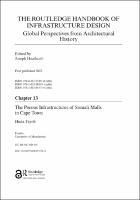Chapter 13 The Porous Infrastructures of Somali Malls in Cape Town
Proposal review
Abstract
This chapter takes as its subject a series of contingent mixed-use urban markets that have been established in Cape Town, South Africa, by migrants, refugees, and asylum seekers from various parts of the African continent. Known colloquially as ‘Somali malls,’ these markets typically occupy once-vacant or underused office blocks, filling them with multiple small shops, services, and residences. Read through the lens of infrastructure, these spaces of flows tie Somali diasporic communities into transnational networks of sociality and exchange. Through novel forms of organization, procurement, display, and hospitality, proprietors optimize the spaces internally within buildings while at the same time constructing networks that exceed the building envelope, creating a flexible, multiscalar set of practices. Women comprise the large majority of traders in the Somali malls, carving out spaces not only for merchandising and earning a living, but also for the construction of migrant sociality in a new and unfamiliar world. This research approach is grounded in broader anthropological approaches and architectural fieldwork methods. The resultant multiscalar reading of informal migrant markets, not usually found in spatial archives, questions dominant readings of infrastructures in post-colonial contexts.
Keywords
Infrastructure, cape town, somali malls, architecture, global perspectivesDOI
10.4324/9781003093756-18ISBN
9780367554910, 9781032188393, 9781003093756Publisher
Taylor & FrancisPublisher website
https://taylorandfrancis.com/Publication date and place
2022Grantor
Imprint
RoutledgeClassification
Architecture


 Download
Download